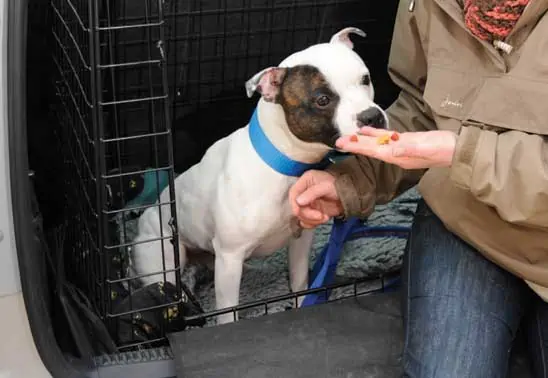How to Prevent Pet Car Sickness

Do Not Feed Your Pet before Leaving the House
If you know that your pet is going to get car sick, avoid feeding him or her before you leave the house. It may be the time of day when you would normally feed the cat or dog, but he or she is just going to throw all the food up anyway. It is best to avoid giving your pet food so that he or she has a minimal amount of it in the stomach. If you have a long trip to make, you may be able to give your dog a few treats when you stop to take breaks. Just try to keep the amount of food to a minimum.
Keep Your Pet Caged, If Possible
If your cat or dog is small enough to go in a pet carrier, you need to keep him or her there. This will limit the amount of movement the pet has, and it will ensure that any vomit will be contained in a small area. Your pet may not like being cooped up, but it will save you a lot of hassle if something goes wrong.If your pet is too big for a carrier, put blankets down to protect your vehicle's interior. This will also help you collect the dog hair that may sluff off in travel, making cleanup easier all the way around.
Avoid Driving on Bumpy Roads
Car sickness is a form of motion sickness, which means that it can be aggravated by excessive motion. If you have alternative routes to take to get to your destination, try to find the one that is going to be the least bumpy. That way the pet does not have to roll around in the cage and get even sicker than he or she is. Your drive may end up taking longer, but it will improve the overall feelings that your pet has.
Turn on the Air Conditioner
Motion sickness can be somewhat relieved with cold air. This theory applies to humans just as much as it does pets. Try to put the air conditioner on, and point the vents on your dog or cat. You could also get a handheld fan to put near the door of the carrier. This may not get rid of the problem entirely, but it may calm your pet enough for him to get through the trip.
Talk to Your Vet
Pet car sickness is never easy to deal with, but it is more common than you would think. If you are really concerned about your pet's health, you can talk to your veterinarian about possible treatment options. He or she may be able to recommend a medication to give your cat or dog to alleviate the problem.



